I wish to extend special thanks to Kitty Fischer and Clayton Valli, who read most of this manuscript; Ben Schowe, Jr. and Sarah Val for their support and ideas; Donna Walls and Mike Olson for their generosity and patience in helping me through the Gallaudet University archives; Winfield McChord and Frank Asklar, for taking me through the museum and archives at the American School for the Deaf; Cindy Bailes and Victor Galloway, for first-hand reports about the acquisition of spoken language and reading skill in deaf children; Annick and Pierre Janty and Alexis Karacostas; Harlan Lane, who taught me so much; and Angela, Rachael, and my mom and dad.
1
He'll Never Be Right
L aurent, hurry up!
I couldn't make out the words exactly on my mother's lips. But I knew what she was saying. She was already fastening her cloak. Outside, the carriage stood ready. My father was giving instructions to the driver.
I tugged at my shoes and pretended to rush, but I was in no hurry. I was six years old, old enough to hate trips to the doctor. I hated the big hands on my face, the tugs at my chin and earlobes, and the rough edges of instruments pushed into my ears. I also hated the way the doctor shook his head when he was donelike he had something in his mouth that tasted bad.
Most of all, I hated how my mother cried.
Something was wrong with me. I didn't know exactly what, except that I lacked talent with my mouth. Other people's mouths sent messages. It seemed so easy. They aimed their mouths at each other, wiggled their lips, sometimes got a lump in their throats, and a message transpired. They even tossed messages to one another's back. They still caught them. My brother Franois used his mouth a lot.
I always watched. But I couldn't understand messages; I couldn't send messages either. When I tried, Franois laughed and my mother looked embarrassed.
Sometimes, I knew, people aimed messages at me. I would see their heads turn and lips move. I would see laughter. I never knew what I did that was so funny.
I had known something was going to happen. My father usually ignored me, but several nights ago, he called me to his side. He looked at me strangely, brought his face close to mine, and moved his lips until his face turned red.
I knew he was trying to send me a message. I missed it, of course, but I understood that it was serious. I nodded.
Then mother, who usually went to church three times a week, started going every day. Most of the time, I went with her. It was more fun than staying at home. I liked the church. I liked its darkness and I liked its smell. I even liked the small man in a robe who presided there.
It was boring, though, after the first few minutes, and I preferred to play outside. No one seemed to mind. Sometimes, I explored the caves in the surrounding hills. Sometimes, I just sat and watched the river. Mother would come to look for me when she was ready to leave.
Yesterday, I had become restless and gone back to the church to look for her. I found her kneeling, the robed man at her side.
When he saw me, he helped my mother up, and they both came to me. The man took my face in his hands, closed his eyes, and moved his lips. Finally, he made a cross on my forehead with his fingers.
On the way home, I tried to ask my mother about it. I really wanted to know why that man was holding my face and making a cross on my forehead. I think my mother tried to understand me. She stared at me for several moments. Then she looked away.
I don't know why I tried to send her messages. She never understood me. The gestures my brother and sisters and I used to communicate were still a mystery to her. She only understood messages from the mouth.
When we got home, I asked Franois. Franois always seemed to know everything. When he returned from school, I grabbed his arm and demanded his attention. He let me turn him to face me and watched me with the patience that made me love him.
I gestured at our mother and the chair where our father usually sat. Something was wrong with both of them, I indicated. The house was in an uproar.
What's going on? My whole body asked the question.
Unlike my mother, Franois understood my gestures immediately.
Doctor, he signed.
He used the gesture we had invented ourselves, pretending to draw a mustache on his lip and then outlining a huge stomach with his handsa perfect description of my first doctor.
His face didn't say awful, like it usually did when heor Isaid doctor. But I felt sick to see the word. Why was he smiling? He knew how I hated doctors.
I turned away to express my annoyance. He restrained me, trying to keep my eyes on him. For some reason, he was excited about this trip.
Faraway, he signed, extending two fingers to arms length, another sign we had invented together.
Famous, he said this word, I think, as he tried to act out greatness and respect.
He stood before me looking hopeful and happy. Cheer up,' his grin seemed to say. This doctor will be different. The strangeness will go away. Mother will not cry afterward. You will send messages and understand them, too.
I didn't believe it. For a moment, though, I tried to smile at him.
I finished putting on my shoes and raced to the carriage, trying to make up for my tardiness with a show of speed. My father ignored me. He was gentle to my mother, though, helping her up to the seat and kissing her cheek. Then we were off. As we headed down the familiar street, I thought again about Franois. I hoped he was right to be so cheerful.
The carriage rolled out of the town and I nestled against my mother. Her eyes were closed and her lips moving. For a long time I looked out the window.
Finally, I saw the outline of a city. It was Lyon, I would learn later, a great city in southern France. At the time, I didn't know the name of that city, or my country, or even my hometown, La Balme. I only knew that Franois might be right. Perhaps in this grand place, a doctor could be found who could do what other doctors could not. I felt a ray of hope.

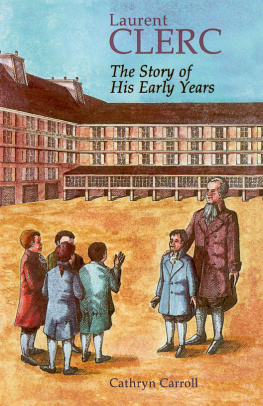
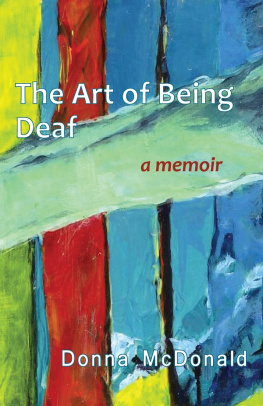
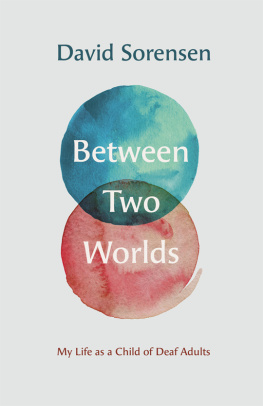
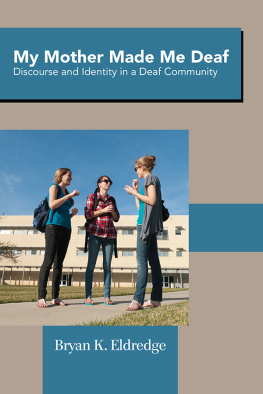
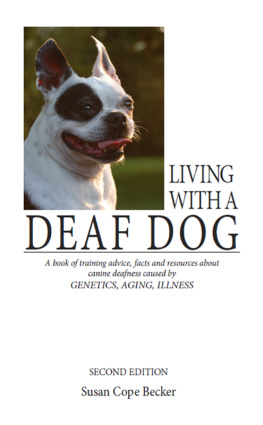

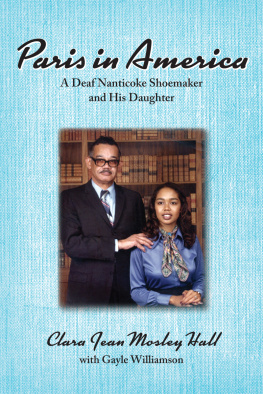

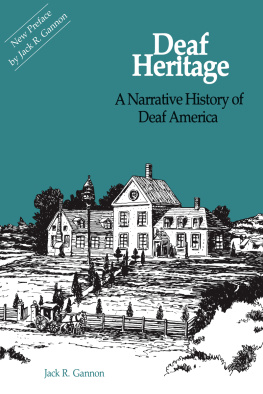
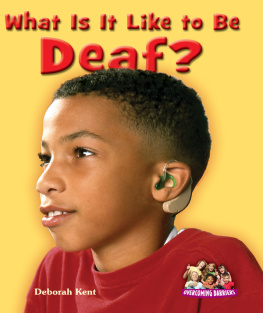


 The paper used in this publication meets the minimum requirements of American National Standard of Information SciencesPermanence of Paper for Printed Library Materials, ANSI Z39.48-1984.
The paper used in this publication meets the minimum requirements of American National Standard of Information SciencesPermanence of Paper for Printed Library Materials, ANSI Z39.48-1984.